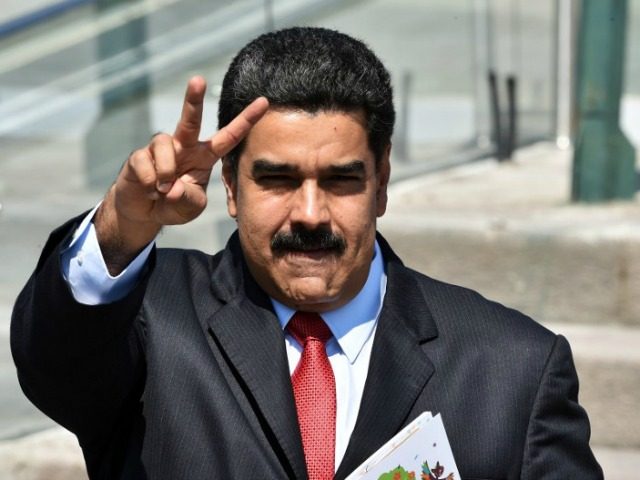A recall vote against Venezuela’s socialist president, Nicolas Maduro, has been crushed by the government, less than a week before the next stage in the process was scheduled to begin.
In essence, a second-round of petition gathering was needed to trigger a recall referendum, but the national election authority has decreed the first round of petitions contained too many irregularities to let the process continue.
The Associated Press reports, “alleged fraud in a preliminary signature-gathering effort” was cited as the reason for canceling the vote:
The opposition immediately blasted the decision as unconstitutional.
“We alert the diplomatic corps in our country that the government today is pushing toward a very dangerous scenario,” former presidential candidate Henrique Capriles said on Twitter.
The official announcement came as a shock to many Venezuelans, who were gearing up for the chance to sign petitions next week seeking the embattled leader’s removal. To trigger a stay-or-go referendum, the opposition needed to collect and validate some 4 million signatures from 20 percent of the electorate in 24 states over three days next week.
Critics of Venezuela’s 17-year left-wing administration have made the recall their central political issue after being sidelined in Congress and in virtually all other public institutions. But the campaign had already become mostly symbolic after elections officials in September said no vote would take place this year.
That timing is crucial. A successful vote to oust Maduro this year would have triggered a presidential election and given the opposition a good shot at winning power. If Maduro is voted out in 2017, though, his vice president will finish the presidential term, leaving the socialists in charge.
The AP notes the suspicious detail that the electoral council validated the petition signatures in August, but is now citing rulings from courts in four Venezuelan states, alleging fraud in the petition drive to cancel the recall.
The council, which the Associated Press describes as “government-stacked,” also issued a six-month suspension against gubernatorial elections scheduled for the end of the year. In what was no doubt a complete coincidence, opposition candidates were heavily favored to win those elections.
The odds were against Maduro surviving the recall vote too, according to the polls. Opposition leaders responded to the quashing of the recall by calling for massive street demonstrations.
The Wall Street Journal observes that the court challenges to the recall petition were filed by “four ruling-party governors,” who presented no actual evidence for their charges of fraud.
“There won’t be a referendum, and with the support of the constitution, we won’t allow them to try to cheat our people again,” one of the governors declared on Twitter. However, constitutional lawyer Jose Vicente Haro denounced the election authority’s decision as unconstitutional, because local criminal courts have no jurisdiction over national elections under Venezuelan law.
The WSJ summed up the state of affairs in Venezuela:
The ruling represents a dark moment for an opposition movement that started the year buoyant, with a supermajority in congress and what its leaders thought was the political capital to end 17 years of socialist rule that left a once prosperous country struggling to feed its own people. But while Mr. Maduro’s popularity has continued to fall, he has handed over more power to the military while the courts neutralized the congress and blocked opposition plans to overhaul the economic model. Now, it increasingly appears that Mr. Maduro will finish out his term in 2019, even as the economy continues its collapse.
The BBC quotes opposition leader Henrique Capriles Radonski warning that the government was “pushing toward a very dangerous scenario in which the crisis worsens.”
A short time later, Capriles announced he had received a court order barring him from leaving the country. Similar orders were issued to several other Maduro opponents, including Jesus Torrealba, head of the main opposition coalition.
Opposition leaders have good reason to fear more serious reprisals than a travel ban. Maduro’s vice-president Diosdado Cabello has demanded prison sentences for everyone involved in “election fraud,” which is increasingly how Venezuela’s socialist strongmen describe everyone opposed to their apocalyptic misrule.

COMMENTS
Please let us know if you're having issues with commenting.